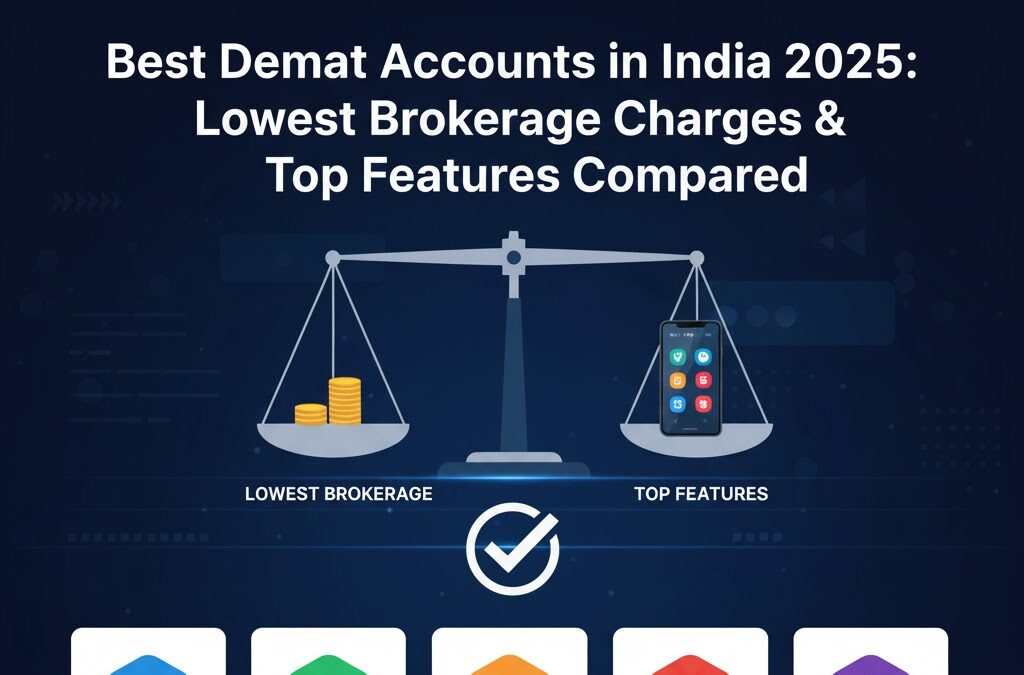In 2025, choosing the right demat account is more important than ever. With an increasing number of retail investors entering the market, and with brokerage charges, account-maintenance fees, and trading platforms becoming highly competitive, selecting a demat account that offers low brokerage, strong features, and transparent cost structure can significantly impact your investing/trading profitability.
This article will compare some of the best demat accounts in India for 2025, highlight the lowest brokerage options, and outline the key features you should look out for.
What to look for in a demat account provider
When evaluating demat accounts, consider the following factors:
- Account opening & AMC (Annual Maintenance Charge): Some brokers waive these for certain plans, while others charge year after year.
- Brokerage fees & transaction charges: Including for equity delivery trades, intraday, futures & options (F&O). Some brokers now offer zero brokerage on delivery trades.
- Trading & demat-platform interface: How user-friendly the app/website is, reliability, speed, and ease of linking trading + demat + bank account.
- Additional services: Research reports, advisory support, margin facilities, depository participant (DP) charges, remat/demat certificate charges.
- Transparency of costs: Hidden charges like depository fees, minimum brokerage, commitments etc. For example, flat-fee models may still have deposit/withdrawal penalties or special conditions.
Top Demat Accounts in India in 2025 (with lowest brokerage & features compared)
Here’s a comparison of some leading demat account providers in India in 2025, focusing on brokerage & feature highlights:
Zerodha
- Delivery (equity) trades: zero brokerage.
- Intraday/F&O trades: Flat ₹20 per order or ~0.03% whichever is lower.
- Account opening: Free; maintenance charges apply for demat from year 2 onward.
- Platform & ecosystem: Strong trading platform, good reputation for discount brokerage.
- Best for: Cost-sensitive investors and active traders who prioritise low delivery cost and decent platform.
Upstox
- Delivery trades: Often free or very low.
- Intraday/F&O: Flat ~₹20 per order or 0.05% whichever lower.
- Account opening: Free; nominal AMC applies in many plans.
- Platform: Good mobile/web trading experience, suited for beginners + traders.
- Best for: Investors who want a low-cost option and intuitive platform.
Groww
- Delivery brokerage: Zero or very minimal (e.g., zero for many equity delivery trades) in certain plans.
- Intraday/F&O: Flat ~₹20 or ~~0.05% per order (whichever lower) in many cases.
- Account opening & AMC: Many plans with ₹0 opening & maintenance.
- Best for: Beginners/new investors who want simplicity and very low cost.
Angel One
- Delivery brokerage: Zero or very minimal in many plans.
- Intraday/F&O: Flat ~₹20 per executed order.
- Additional features: Offers research/advisory services, full-service broker features in addition to discount pricing.
- Best for: Investors who want low brokerage + access to advisory or research features.
Lowest-Brokerage Highlights & What They Mean
- The lowest brokerage delivery trades among well-known brokers are zero in many cases (Zerodha, Groww).
- Flat-fee models (e.g., ₹20 per executed order) are becoming common for intraday/F&O.
- Some newer or less-known brokers/promotions even advertise zero brokerage across segments under special plans.
- But: Even “zero brokerage” doesn’t always mean zero cost — you must check for depository charges, certificate remat charges, courier, minimum account values etc.
- As emphasised by major brokers, selecting the right price model involves comparing account opening, AMC, trading frequency, hidden charges.
How to Pick the “Best” Demat Account for You
Here are practical steps:
- Define your style — Are you a delivery investor or frequent trader (intraday/F&O)? If you mostly hold stocks long-term, delivery brokerage (ideally zero) matters most.
- Estimate your trading frequency & volume — If you trade often, per-order flat fees matter. If you trade rarely, AMC & account opening charges weigh more.
- Compare full cost — Not just brokerage: account opening fee, AMC, depository participant charges, remat/demat certificate fees.
- Check platform & features — Execution speed, app reliability, research/advisory (if you need it), user interface.
- Understand hidden clauses/promotions — Some “zero brokerage” offers may be for a limited period or specify conditions.
- Support & service quality — Even though cost is important, poor service or platform downtime can hamper your trading/investing.
- Long-term view — If you intend to hold for years, go for minimal cost + good reliability rather than chasing ultra-low-cost for frequent trading you won’t do.
Summary Table
| Broker | Delivery Brokerage | Intraday/F&O Brokerage | Account Opening / AMC Highlights |
|---|---|---|---|
| Zerodha | ₹0 for delivery trades | ₹20 per order or ~0.03% | Free opening; AMC applies from 2nd year |
| Upstox | Very low / often free | ~₹20 per order or ~0.05% | Free opening; small AMC in some plans |
| Groww | Zero or very low | ~₹20 or ~0.05% per order | Free opening & maintenance in many plans |
| Angel One | Zero or minimal in many plans | ~₹20 per order | Free opening; may have AMC depending plan |
Conclusion
In 2025, the demat account landscape in India offers excellent options for investors/traders with very low brokerage, free or minimal account maintenance, and feature-rich platforms. If you prioritise lowest cost, then discount brokers like Zerodha, Groww, Upstox lead the pack. If you also want research/advisory bundled in, then a low-cost full-service broker like Angel One might strike a good balance.
